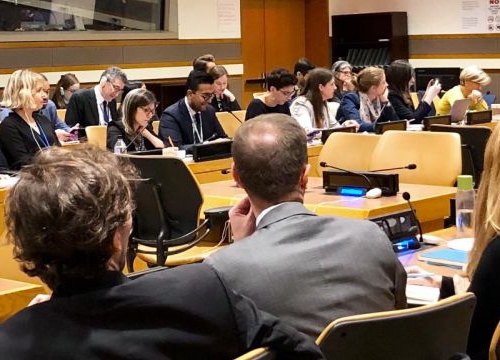Launch in New York: Guidelines on Investigating Violations of IHL


Geneva Academy
14 October 2019
Investigations into alleged violations of international humanitarian law (IHL) by the parties to an armed conflict are not only crucial to securing respect for IHL, but also to preventing future violations and enabling redress for victims of past violations. Despite the unquestionable importance of investigations, there is a lack of detail with regard to the international law, principles and standards relevant to investigations in armed conflicts. This is further reflected in the disparate practice across states in the way investigations are carried out.
The new Guidelines on Investigating Violations of IHL: Law, Policy, and Good Practice – the outcome of a five-year project initiated in 2014 by the Geneva Academy and joined in 2017 by the International Committee of the Red Cross (ICRC) – aim to bring much needed clarity and support for the conduct of effective investigations into violations of IHL.
Presentation to the New York Diplomatic Community
In an event co-organized with the Permanent Mission of Switzerland to the United Nations (UN) in New York, two of the authors – Noam Lubell and Jelena Pejic – presented the 16 guidelines before a full room of delegates from the UN General Assembly First and Sixth Commissions, UN agencies, and experts.
Jelena Pejic, Senior Legal Adviser at the ICRC introduced the process and made a general introduction to the Guidelines. Noam Lubell, former Swiss IHL Chair at the Geneva Academy and Professor of International Law at the University of Essex, discussed some challenging issues encountered in the drafting process and the choices made to resolve them. He also addressed the interplay between IHL and international human rights law (IHRL), matters such as recording operations, how to define incidents, what are administrative investigations, and how to catch systemic problems. Professor Sarah Cleveland, a former member of the UN Human Rights Committee, explained where the Guidelines fit in the gap between IHRL and IHL with respect to investigations, including in relation to the right to life.

‘This event forms part of the Guidelines’ promotion and dissemination and aimed at presenting and discussing them with states. As a key resource and practical guide for military lawyers and persons in charge of investigations, our ultimate goal is that states start using these guidelines when conducting investigations into violations of IHL’ explains Marco Sassòli, Director of the Geneva Academy.








